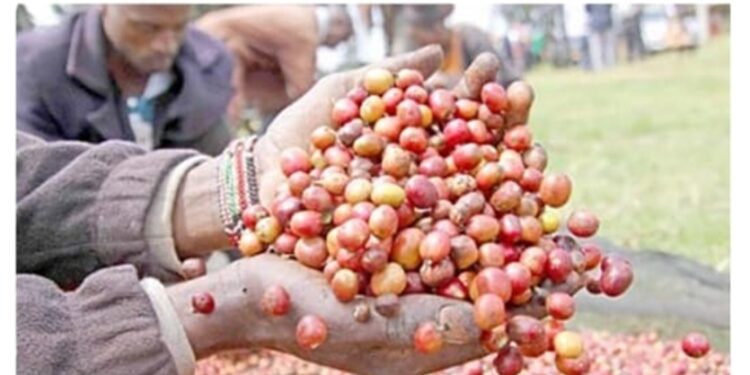The Kenyan government, under President William Ruto’s administration, has continued to gradually implement transformative interventions aimed at revitalizing the coffee sector, benefitting smallholder farmers, and boosting national economic returns. These deliberate reforms are fostering growth, enhancing transparency, and increasing farmer earnings in a once-struggling industry.
At the core of these reforms is the Coffee Cherry Advance Revolving Fund (CCARF), a facility established to provide affordable, accessible, and sustainable credit to smallholder farmers cultivating less than 20 acres of coffee. As of the end of 2024, over 497,000 farmers from 27 counties have been able to access loans totaling Ksh6.7 billion, a monumental leap from the Ksh1.1 billion advanced in late 2023. The fund, administered by the New Kenya Planters Cooperative Union (New KPCU), is a testament to the government’s commitment to empowering coffee farmers.
The surge in borrowing from the CCARF can be attributed to several factors, including reduced interest rates, streamlined disbursement systems, and improved governance. According to New KPCU Managing Director Timothy Mirugi, the government’s awareness campaigns and simplification of the application process have motivated farmers to utilize the fund. Loans now take less than 72 hours to process, a dramatic improvement from the previous 5 to 14 days.
Counties in the Mount Kenya region have been the primary beneficiaries of the fund, borrowing Ksh4 billion, or 59.7% of the total amount. Nyeri County leads with 82,927 farmers borrowing Ksh943.4 million, followed by Kirinyaga with 99,258 farmers accessing Ksh845.6 million. Other top borrowers include Kiambu, Murang’a, Embu, and Meru counties, collectively borrowing substantial amounts to support their farming activities.
The government’s interventions extend beyond financing. Liberalization of the coffee sector has been a significant milestone, with roles in coffee marketing and regulation clearly separated. The Capital Markets Authority (CMA) has licensed 16 coffee brokers to trade at the Nairobi Coffee Exchange (NCE), the majority of which are farmer-owned, ensuring that small-scale growers have greater control and better returns.
To guarantee higher earnings for farmers, the government introduced the Direct Settlement System (DSS), a technology platform supervised by the CMA. The DSS ensures prompt payment to farmers and has achieved zero loan defaults, boosting trust and morale among stakeholders. Moreover, the Coffee Directorate at the Agriculture Food Authority (AFA) has reported increased production potential, with coffee bushes expanding into non-traditional regions such as Trans Nzoia, Uasin Gishu, Nandi, and Nyamira.
Efforts to stabilize the sector also include increased cherry advance payments, rising from Ksh20 to Ksh80 per kilogram. This initiative has directly boosted farmers’ incomes and encouraged higher production levels. The administration’s vision is to triple coffee output from 40,000-50,000 metric tonnes annually to over 150,000 metric tonnes by 2027.
Debt relief for nonperforming loans owed to cooperative banks, coupled with the establishment of a coffee development fund, has alleviated financial burdens on farmers. Enhanced access to credit guarantees minimum returns, ensuring that small-scale farmers remain motivated despite market fluctuations. Such measures underscore the administration’s commitment to sustainability and long-term growth.
Marketing strategies have also been enhanced. The government has developed a strong brand identity for Kenyan coffee, emphasizing its quality and consistency in global markets. By participating in local and international trade fairs, fostering relationships between growers and buyers, and gathering industry intelligence, Kenya is positioning itself as a premier coffee producer on the global stage.
President Ruto’s administration has not only focused on production but also on addressing structural challenges in the sector. The enactment of a coffee bill introduced stricter regulations for processing, pesticide use, and quality standards. Additionally, a 2.5% levy has been established to fund research, marketing, and regulatory efforts, ensuring continuous innovation and improvement in the sector.
Recognizing the importance of collaboration, the government convened the National Coffee Stakeholders’ Conference to identify and address pressing challenges. This forum brought together key players in the coffee value chain, fostering dialogue and aligning strategies for sectoral growth.
These interventions have brought new life to the coffee industry, with national and county governments working in tandem to ensure transparency, efficiency, and profitability. By expanding production to non-traditional areas and increasing farmer participation through accessible financing, Kenya’s coffee sector is poised for a robust revival. The efforts have not only empowered farmers but also significantly contributed to the national economy, securing Kenya’s position as a leading coffee exporter.










